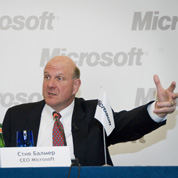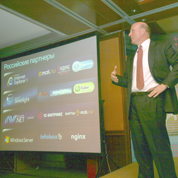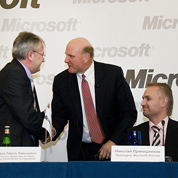Microsoft underscores Russia strategic importance with $300mln investment commitment
Issue:
June 2009, Vol. 4, No.5
Tags:
Microsoft

The management of Microsoft Corp., the U.S.-based, world’s largest international software and related gadgets manufacturer, has reaffirmed its trust in the Russian economy by pledging to commit R10bln (over $300mln) to the country over the next three years.
The new investment is a part of the ambitious plans announced by the corporation’s CEO, Steve Ballmer, during his visit to Moscow in April, where he took part in the Microsoft ReMIX09 IT conference that was dedicated to the promotion of the software giant’s latest technologies for Internet user, web developments and designs. Specifically, the investments will be directed at further expanding the software giant’s footprint in the Russian software industry in particular, as well as boosting the overall development of the local IT industry through the establishment of mutually beneficial social and scientific cooperation with the Russian government, state-affiliated institutions and private businesses, including start-ups.
Besides, Ballmer also said that Microsoft plans to invest over $9bln in far-ranging R&D activities worldwide in 2009 and continue the expansion of its Information Dissemination and Equal Access (IDEA) and Innovation Centers, the vehicles through which Microsoft work via its local subsidiaries with universities, startups, etc. to develop new technologies in countries of its geographical presence. But more important is the fact that a significant part of the $9bln is also expected to flow to Russia as Microsoft plans to open one more IDEA center later this year, in addition to 10 such centers already functioning in the country.
Economic slump not deterrent to Microsoft’s vision for Russia
Today, Microsoft’s multibillion-ruble commitment to the Russian economy is, indeed, of special importance, given the current unprecedented distress in the global economy in general, and the financial ‘draught’ on the international capital markets in particular. Therefore, this step can be seen as a reflection of Microsoft Corp.’s belief in the sound health of the local economy, compared to other major economies on one hand, and more importantly as a practical manifestation of its long-term strategic vision for the local market. According to the plans outlined by Ballmer, the over $300mln investment will be used to deliver short-term, anti-crisis programs and execute other Microsoft’s longer-term projects in Russia, which is rapidly becoming a top-priority strategic market for the world’s No. 1 software giant., where its Moscow-based local subsidiary, Microsoft Russia, has long carved itself a big chunk of the local software industry.
"Russia is such a strategically important market for Microsoft that we are fully committed to contributing in ways that will help create sustainable economic growth in the country."
Acknowledging the global economic downturn and its pan-economic drastic negative impacts, Ballmer said he was highly positive about the future, noting that although the global economy’s growth over the past decade was built on debts, the lion’s share of that growth was generated through hard work, innovation and high labor productivity. “Therefore, there is no better time than today to start getting prepared for the future, and this is precisely why Microsoft is forging ahead with its investments, including those being committed to the Russia,” Ballmer said, when asked to explain the rationality behind the timing and the reasons for investing such a sum into the Russian economy at the height of a persistent global economic crisis. “The global economy today is really challenging, and Microsoft is, certainly, not immune to these challenges.” However, Microsoft, according to Ballmer, is reacting adequately to the changes in the global economy through reduction of operations and investments in some areas, while boosting them in the others. “And with regard to Russia, I think it has one of the brightest futures, both as a market and as a source of new technology developments.”
Highlighting the strategic nature of its financial commitment
The strategic nature of Microsoft’s new multimillion-dollar commitment was further emphasized by Ballmer’s full endorsement of the remedial, anticrisis actions taken so far by the Russian government in the context of the global economic downturn, calling them ‘amazing work in fighting the global economic crisis.” Indeed, Ballmer’s staunch belief in the Russian economy, which underlined Microsoft’s readiness to commit over $300mln at the height of a an unrelenting global economic downturn, must have been based on what he had personally seen in the country and also from his frank ‘tete-a-tete talks’ with some top members of the Russian business and political leadership during the April visit.
Specifically, Ballmer met with Russian First Deputy Prime Minister Igor Shuvalov, the top official overseeing the government supercommittee created by Kremlin and Russian Cabinet to map out and execute anticrisis strategies aimed at securing an accelerated exit from the global economic slump with minimal losses for the country and its citizens. “We are very appreciative of the amazing work the Russian government is doing in fighting the global economic crisis and other adopted measures aimed at sustaining long-term growth through innovation and productivity,” Ballmer said, adding that Microsoft plans to help Russian government in some of these undertakings. “In addition to helping the government create a more efficient healthcare system and support the Sochi-2014 Winter Olympics, Microsoft also plans to create new innovation and research facilities designed to help Russia respond to the current economic crisis and ensure long-term growth of its economy.”

Ballmer also noted his acknowledgment of the importance of developing the local IT industry as a foundation for shaping the budding local innovative economy in a way that will make it more attractive for Microsoft-branded goods and services, both in the software market segment and also across other IT interdependent economic sectors. “Technology innovation is an important driver of long-term economic growth, and we, at Microsoft Corp. applaud the vision that Russia’s leaders have shown during the current economic downturn, as they have made historic structural reforms that will speed the transition to a national economy based on innovation,” he added. “This is important because Russia is such a strategically important market for Microsoft and, therefore, we are fully committed to contributing in ways that will help create sustainable economic growth in the country.”
Ballmer also underlined the importance of the existing cooperation with Russian companies for both Microsoft’s business growth and the overall development of the Russian IT market in general. “One of the largest joint projects to be undertaken is the opening of the Microsoft Technology Center in Moscow, which will be the first of its type in Eastern Europe. “The mission of the center will be the creation and promotion of the latest IT solutions for Russian companies. Over 1,000sqm in size, the center will be equipped with the latest technologies to enable customers evaluate the products and solutions created by Microsoft partners based on Microsoft technologies.”
Besides, Microsoft, via its local subsidiary, Microsoft Russia, is also actively involved in the development of partnership with Russian research organizations in the field of R&Ds that are far outside the company’s traditional scope of R&D activities. For instance, Microsoft Russia signed a strategic agreement on the creation of a joint research center with the Space Research Institute (SRI), an affiliate of the Russian Academy of Sciences, in Moscow on April 20. The agreement represents the next stage in cooperation between the Microsoft Research Laboratory in Cambridge and SRI. The three-year project, according to the agreement, penned by SRI Deputy Director Ravil Nazirov and Microsoft Russia President Nikolai Pryanishnikov, will be based on the SRI premises and provide fundamental research results for government services. According to the signatories, the noncommercial agreement provides for joint researches into factors that influence global climatic changes and other ecological issues and the interrelations between them.
“I think Russia has one of the brightest futures, both as a market and as a source of new technology developments.”
Hailing the agreement as breakthrough in climate change researches, Pryanishnikov noted that Microsoft was very happy that its first-ever research center dedicated to the study of climate changes will be created in Russia in cooperation with one of the country’s top research institutes. “The findings from these studies will be used by government agencies such as the Natural Resources, Emergency Situations and Agriculture Ministries as well as agro enterprises and fire-fighting services,” he said. “We believe that this work can make significant contributions to the development of an innovative economy and make life in our society much safer and more effective.” And, commenting on the unique agreement and its implications for Russia, the software industry and the global ecological situations in general, Ballmer noted that the issue of climate change is not a core software problem, but “an opportunity for innovation and scientific breakthrough, as software constitutes a key part of the way non-IT industries are developed.”
Target destinations for Microsoft’s multibillion-ruble investments
One of the numerous targeted destinations of the multibillion-ruble investment, according to Ballmer, is to launch, in cooperation with the Russian government, specific programs on teaching basic computer skills and intensive training courses for IT students and other undergraduates in Russian schools. Currently, there are 60 Microsoft-branded training centers in 43 Russian regions, with plans to launch more in each of the remaining regions, bringing the overall total to 100. “Through this initiative, up to 300,000 people will get an opportunity to improve their IT skills by attending courses at the Microsoft training centers. This will give them a competitive advantage on the skills market and a better chance of employment opportunities during this economic downturn,” he added. “Students taking these intensive training programs, which are now available at more than 200 universities, where the Microsoft IT Academies are located, will benefit from the opportunity to obtain additional IT skills. After they graduate, they will be more highly-skilled and prepared for employment and professional career growth.”

Another destination for the investments is the provision of financial and other forms of business support for local innovative start-ups in the software and related software services market. This will help boost the expansion of the local IT industry as well as help fuel innovations in the other economic sectors that are not directly related to the software/IT industry. In other words, Microsoft is geared towards providing significant support for all start-ups, irrespective of their industrial specializations because most private-sector job creation usually occurs in the SME sector during economic recession. In this regard, Ballmer said Microsoft will make a range of its products available, including infrastructure solutions and software applications for up to ten users, free-of-charge to over 1,000 Russian companies, effective from 2009.
Talking about the long-term programs, Ballmer emphasized that Microsoft views education as one of the most important fields for its human investment. “Consequently, Microsoft will continue developing its Innovation Centers in leading Russian technical universities. Currently, 10 Microsoft-branded Innovation Centers are operating in the country, “five of which were opened in the last six months.” Also, Ballmer said the unique Microsoft DreamSpark Program will be extended to include high schools. “This means free access to the best Microsoft innovative solutions for developers and designers will now be made available not only to Russian university students, but also to Russian high school children as well.”
With this scope of unprecedentedly ambitious plans ever designed by a foreign corporation for Russia, combined with the broadness of the financial support pledged to implement them, and the concrete timetables for the overall executions, mostly between 2009 and 2012, one can say that Microsoft Corp. is, indeed, really in Russia to stay, and for a very long time, as one of the most reliable major foreign strategic investors that really cares for the country and its citizens’ economic prosperity.












 Web design,
Web design,